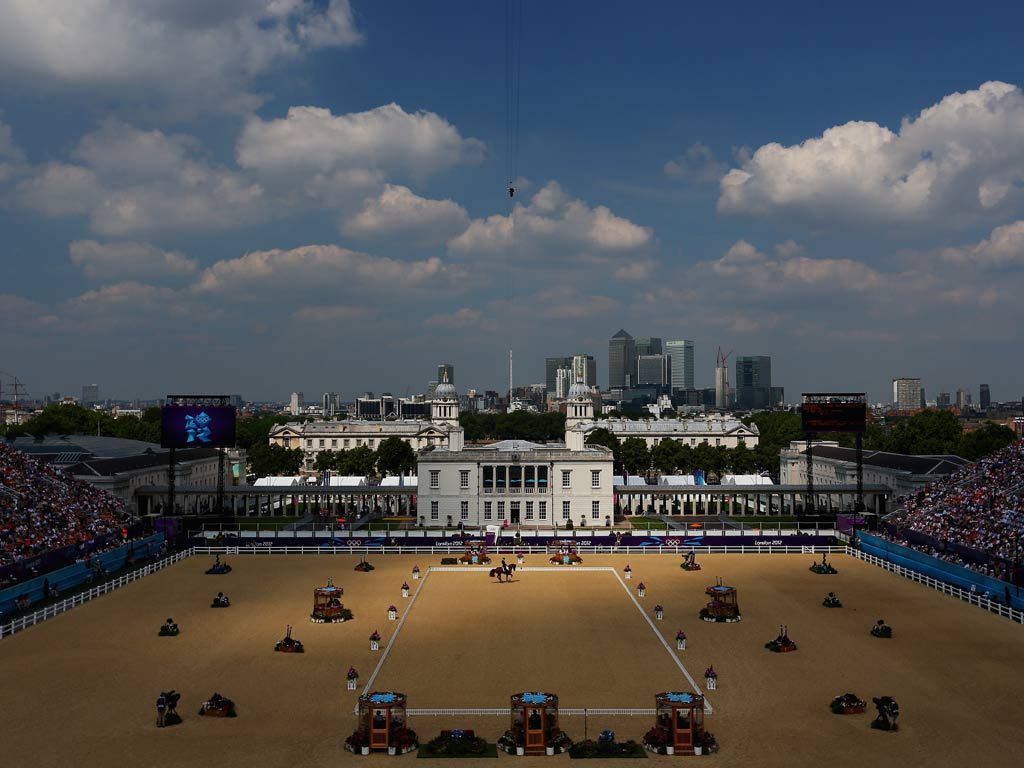Welcome to the modern pentathlon: the oddest test of a complete athlete
Charlie Cooper tries his hand at one of the last events of the Games, for long the preserve of 'officers and gentlemen'

James Bond, the records tell us, never competed at an Olympic Games. If he had, there is no doubt his event of choice would have been the modern pentathlon.
One of the last events at the Games will be one of the most exciting and challenging but it will also be terribly civilised. Competitors must sword-fight, swim, ride a horse, run, and finally shoot their way to Olympic glory. Throw in an exotic location and a dangerously seductive woman and Roger Moore would be a shoo-in for the winners' podium.
The pentathlon is the ultimate test of the "complete athlete". Competitors must outwit an opponent in fencing, aim a laser pistol under intense pressure and master a horse they have never ridden before – all in one day. The men's event takes place today, the women's on Sunday. The last gold medal of London 2012 will be awarded to a pentathlete – and there's every chance that a British one will win it.
Baron Pierre de Coubertin, founder of the modern Olympics, wanted the pentathlon to test "a man's moral qualities as much as his physical resources and skills, producing thereby the ideal, complete athlete." He chose the events, based on the apocryphal story of a military messenger riding his horse deep behind enemy lines. He loses the horse and has to fend off attackers with sword and pistol, before swimming across a raging river to deliver his message on foot.
Unsurprisingly, the event has traditionally been associated with the military. It was used as part of final examinations at many European military academies in the early 20th century, and a young American called George S Patton competed at the first modern pentathlon in Stockholm in 1912. The future general came fifth after missing a shot with his pistol – though he claimed he had merely fired his bullet through the same hole twice.
This weekend, in its 100th anniversary year, 36 athletes from 22 nations will compete. The day starts with fencing in the Copper Box arena in the Olympic Park, followed by a 200m swim in the Aquatics Centre. Then it's off to Greenwich Park for show jumping. The grand finale combines the final two events, running and shooting, into a 3km race with pauses after each 1000m in which athletes must take up a laser pistol and hit a target five times, before they are allowed to progress on their way to winning the golden gun. Sorry, medal.
"It is all a bit James Bond, or Indiana Jones," admits Great Britain's modern pentathlon team manager, Dominic Mahony. "It attracts the intellectual athlete as well as those who are physically tough. "
To find out just how challenging it is, I was put through my paces by Team GB's national talent coach, Istvan Gallai, at the University of Bath's Sports Training Village, the home of Pentathlon GB.
"Put some strength into it, you're not going to hurt me," he told me as I gently poked him with my epée. It takes two years to train to a competitive standard in fencing so I wasn't too disheartened by my first stab at it. However, with lacklustre performances in the pool (exhausted after 50 metres) and on the horse (managed to get into the saddle and not a lot else), I only had the running and the shooting to redeem myself. I wasn't dreadful with the pistol, but with my chest heaving from the running I found it near impossible to focus on the target.
Thankfully, Team GB has a fine crop of athletes and a real chance of Olympic gold. Mhairi Spence, 26, our best medal hope, is the women's world champion and Team GB has won medals at three consecutive Olympics since women first competed in the modern pentathlon at Sydney 2000.
The sport has benefited in recent years from widening participation, thanks in part to a drive to open up the traditionally officer-class event to a new generation of competitors from all walks of life. Jon Austin, chief executive of Pentathlon GB, said that £15m of UK Sport investment since 1997 has allowed the pentathlon to broaden its talent base beyond those who can afford the equipment – or a horse.
"The perception of the sport is that it's difficult to access, very expensive and that you have to be from a certain background to compete at the highest level," he said. "This isn't the case. There are many opportunities now to take part in the modern pentathlon at all levels and for all income backgrounds."
Up to four men and four women may compete from each nation and Austin says this year's Olympic qualifiers were the tightest he has seen. Success at the home Olympics could mean thousands more young Brits taking up Baron de Coubertin's challenge to be the "complete athlete". "Pentathlon is slightly crazy," Mahoney concedes. "But then the modern Olympics, another idea of de Coubertin's, must have seemed slightly crazy at the time too."
Join our commenting forum
Join thought-provoking conversations, follow other Independent readers and see their replies
Comments
Bookmark popover
Removed from bookmarks